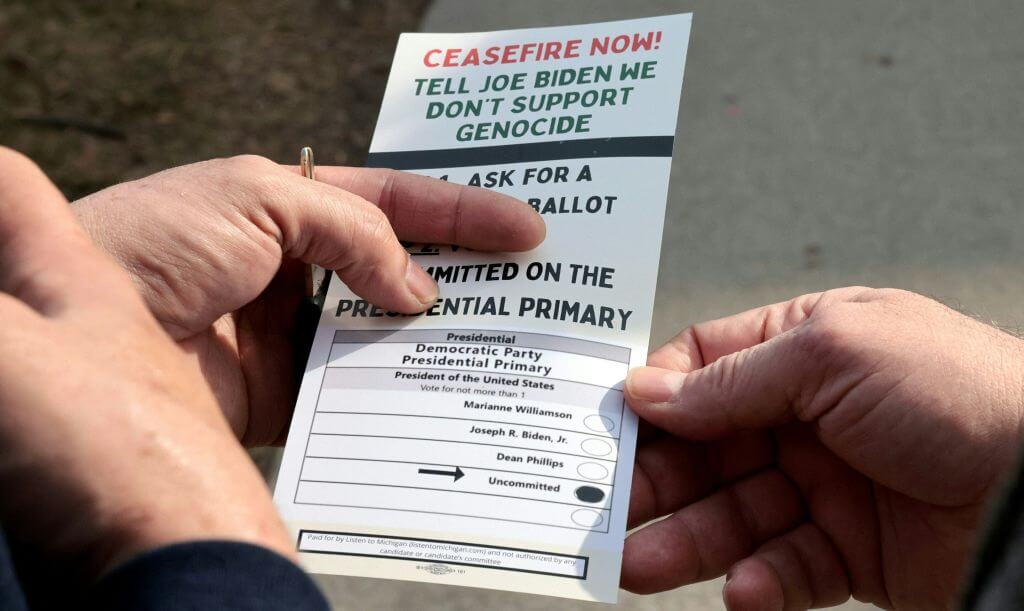Biden faces his first test at the polls after calling for ‘immediate’ ceasefire in Gaza
Activists in Washington state and Georgia are urging voters to cast their primary ballots in protest of Biden’s stance on Israel-Hamas war

A volunteer shows a person how to vote uncommitted Feb. 27. Photo by Jeff Kowalsky/AFP via Getty Images
Buoyed by recent successes in Democratic primaries, the campaign to get more voters to pressure President Biden to rethink his stance on the war in Gaza is working for more wins at the polls Tuesday, days after he called for a ceasefire.
More than a dozen progressive groups have endorsed a campaign to urge Washington state voters to mark “uncommitted” on their ballots.
“Washington state is ready to show that thousands of anti-war Democrats remain uncommitted to Biden as long as this continues,” said Rami Al-Kabra, a spokesperson for the “Uncommitted Delegates Washington” campaign.
Al-Kabra, deputy mayor of Bothell, a Seattle suburb, teamed up with “Our Revolution” — a group affiliated with Vermont Sen. Bernie Sanders — to reach its 132,000 members in the state. The region’s only Palestinian American elected official, Al-Kabra said in a robocall recording that voting “uncommitted” will send a clear message to Biden to “change course in order to save lives in Gaza and prevent a Trump victory in November.”
Another campaign is urging Washington state voters to write “ceasefire” on the blank line below the names of presidential candidates listed on the ballot on March 12.
A similar effort is underway in Georgia, where voters are asked to submit an empty ballot since “uncommitted” is not an option as in other states.
It’s unclear if Biden’s moves in recent days — to show empathy for Gazans, deliver them more aid and pressure Israel toward a ceasefire — will blunt protest votes in this week’s and future primaries.
Leaving a mark on Gaza policy
In recent weeks, more than 200,000 Democratic voters marked “uncommitted” or “no preference” on their ballots. Though it’s unclear how many used the option to protest Biden’s stance on the Israel-Hamas war, organizers of “Listen to Michigan” and other anti-war protest votes are claiming victory. The results mean that there will be at least 20 delegates who carry that message to this summer’s Democratic National Convention in Chicago. And it has agitated the Biden campaign, which fears critics of Israel’s war will sit out the general election in key swing states, including Michigan, Minnesota and Georgia.
Anti-war Democrats call Biden’s efforts to increase pressure on Israel in the past week proof that the protest vote is having an impact. In his annual State of the Union Address on Thursday, he called for an “immediate ceasefire” in Gaza that would allow the release of some 40 hostages kidnapped by Hamas and an increase in humanitarian aid. Just before the address, he announced that the U.S. would build a pier in the Mediterranean to deliver a “massive” boost of American aid to Gaza.
And Biden also acknowledged the protest vote in an interview with MSNBC on Saturday.
“They’re very upset and I don’t blame them for being upset,” he said. “There are families there. There are people who are dying. They want something done about it. And they’re saying, ‘Joe, do something. Do something.’”
But despite a growing rift with Israeli Prime Minister Benjamin Netanyahu, Biden has yet to temper his strong support of Israel, and has resisted calls to halt military aid to the Jewish state or push for a permanent ceasefire. “I’m never going to leave Israel,” Biden said in the MSNBC interview. “The defense of Israel is still critical.”
Stealth candidate?
Though Biden leads in the Democratic primaries with 994 delegates, and “uncommitted” earned two in Michigan last month, a previously unknown candidate who supports a ceasefire won three last week.
Jason Palmer unexpectedly garnered the three delegates when 91 people voted in American Samoa’s caucuses on Super Tuesday.
He said in a recent interview that he will be reaching out to the “uncommitted” movement to get their support. Palmer is on the ballot in the Northern Mariana Islands caucus on Tuesday. He faulted Biden for being opaque about his thinking on the war, and said the president should apply firmer pressure on Israel.
Palmer said he backs Sanders’ call to withhold all aid to Israel until it stops bombing Gaza, and wants to see the U.S. government push for an unconditional “medium-term” ceasefire of at least 90 days. During that period, he said, Hamas should release all the hostages it kidnapped on Oct. 7, and the administration should encourage Israelis and Palestinians to “elect new leadership immediately.”
Palmer said on Friday he has set up calls with organizers of some anti-war protest vote campaigns in hopes of winning their support. But that may not be forthcoming, he acknowledged.
“I am not pro-Palestinian the same way as the protest vote is,” he said, explaining that he has “full respect” for both Palestinians and Israelis. “I honestly don’t know if the protest voters would consider me aligned enough with their cause.”






















